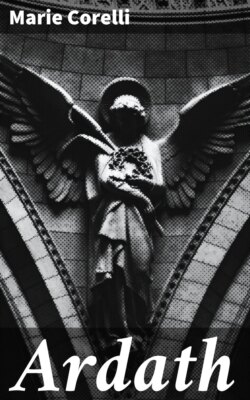Читать книгу Ardath - Marie Corelli - Страница 11
На сайте Литреса книга снята с продажи.
"GLORY FOR EVER AND EVER! AMEN!"
ОглавлениеThen came a pause, during which the thunder outside added a tumultuous Gloria of its own to those already recited,—the organ music died away into silence, and the monk now turning so that he faced the altar, sank reverently on his knees. All present followed his example, with the exception of the stranger, who, as if in deliberate defiance, drew himself resolutely up to his full height, and, folding his arms, gazed at the scene before him with a perfectly unmoved demeanor,—he expected to hear some long prayer, but none came. There was an absolute stillness, unbroken save by the rattle of the rain-drops against the high oriel window, and the whistling rush of the wind. And as he looked, the fiery Cross began to grow dim and pale,—little by little, its scintillating lustre decreased, till at last it disappeared altogether, leaving no trace of its former brilliancy but a small bright flame that gradually took the shape of a seven-pointed Star which sparkled through the gloom like a suspended ruby. The chapel was left almost in complete darkness—he could scarcely discern even the white figures of the kneeling worshippers,—a haunting sense of the Supernatural seemed to permeate that deep hush and dense shadow,—and notwithstanding his habitual tendency to despise all religious ceremonies, there was something novel and strange about this one which exercised a peculiar influence upon his imagination. A sudden odd fancy possessed him that there were others present besides himself and the brethren,—but who these "others" were, he could not determine. It was an altogether uncanny, uncomfortable impression—yet it was very strong upon him—and he breathed a sigh of intense relief when he heard the soft melody of the organ once more, and saw the oaken doors of the grotto swing wide open to admit a flood of cheerful light from the outer passage. The vespers were over,—the monks rose and paced forth two by two, not with bent heads and downcast eyes as though affecting an abased humility, but with the free and stately bearing of kings returning from some high conquest. Drawing a little further back into his retired corner, he watched them pass, and was forced to admit to himself that he had seldom or never seen finer types of splendid, healthful, and vigorous manhood at its best and brightest. As noble specimens of the human race alone they were well worth looking at,—they might have been warriors, princes, emperors, he thought—anything but monks. Yet monks they were, and followers of that Christian creed he so specially condemned,—for each one wore on his breast a massive golden crucifix, hung to a chain and fastened with a jewelled star.
"Cross and Star!" he mused, as he noticed this brilliant and singular decoration, "an emblem of the fraternity, I suppose, meaning … what? Salvation and Immortality? Alas, they are poor, witless builders on shifting sand if they place any hope or reliance on those two empty words, signifying nothing! Do they, can they honestly believe in God, I wonder? or are they only acting the usual worn-out comedy of a feigned faith?"
And he eyed them somewhat wistfully as their white apparelled figures went by—ten had already left the chapel. Two more passed, then other two, and last of all came one alone—one who walked slowly, with a dreamy, meditative air, as though he were deeply absorbed in thought. The light from the open door streamed fully upon him as he advanced—it was the monk who had recited the Seven Glorias. The stranger no sooner beheld him than he instantly stepped forward and touched him on the arm.
"Pardon!" he said hastily in English, "I think I am not mistaken—your name is, or used to be Heliobas?"
The monk bent his handsome head in a slight yet graceful salutation, and smiled.
"I have not changed it," he replied, "I am Heliobas still." And his keen, steadfast, blue eyes rested half inquiringly, half compassionately, on the dark, weary, troubled face of his questioner who, avoiding his direct gaze, continued:
"I should like to speak to you in private. Can I do so now—to-night—at once?"
"By all means!" assented the monk, showing no surprise at the request.
"Follow me to the library, we shall be quite alone there."
He led the way immediately out of the chapel, and through a stone-paved vestibule, where they were met by the two brethren who had first received and entertained the unknown guest, and who, not finding him in the refectory where they had left him, were now coming in search of him. On seeing in whose company he was, however, they drew aside with a deep and reverential obeisance to the personage called Heliobas—he, silently acknowledging it, passed on, closely attended by the stranger, till he reached a spacious, well-lighted apartment, the walls of which were entirely lined with books. Here, entering and closing the door, he turned and confronted his visitor—his tall, imposing figure in its trailing white garments calling to mind the picture of some saint or evangelist—and with grave yet kindly courtesy, said:
"Now, my friend, I am at your disposal! In what way can Heliobas, who is dead to the world, serve one for whom surely as yet the world is everything?"
